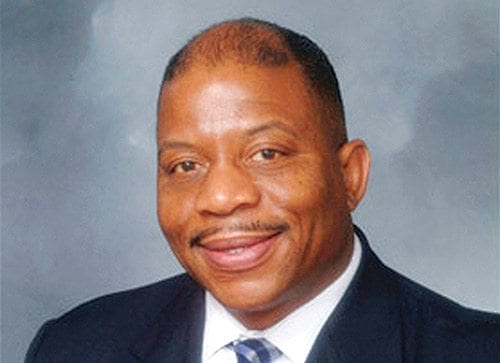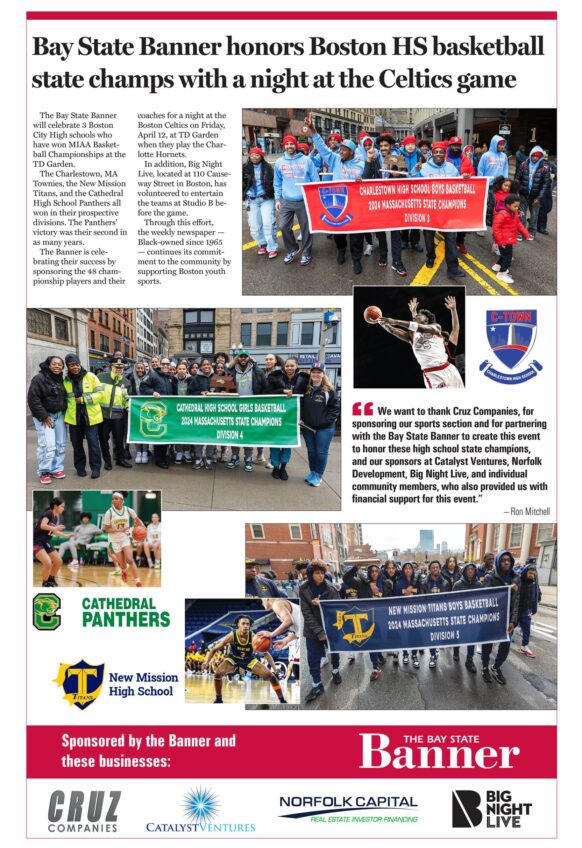
UMass-Boston Chancellor J. Keith Motley announced that he will step down at the end of the academic year, sparking outcry from students, community members and elected city and state officials who rallied outside the State House on Saturday. The campus faces an anticipated $30 million deficit and declining enrollment. University trustees moved to curb Motley’s power by handing over daily operations to former Bowdoin College president Barry Mills last month and allowing Motley’s contract to expire.
Tony Van Der Meer, senior lecturer of Africana Studies, spoke to the Banner several days before the rally. Van Der Meer, like many of Motley’s supporters and others who are watching the situation unfold, says the chancellor is being unfairly blamed for the university’s monetary woes.
“It’s clearly scapegoating of Keith,” Van Der Meer said, noting that Motley was not the sole decision maker in major construction projects that have been blamed for much of the deficit.
Motley’s departure also is charged because it removes a person of color from a highly visible position of authority.
“[Motley]’s had a terrific impact, particularly in the community to have him as a role model and see that’s really possible,” Van Der Meer said.
“This is starting to feel like a systemic attack against black leadership,” Tanisha Sullivan, NAACP president, said at the Saturday rally.
State Rep. Russell Holmes and City Councilors Tito Jackson and Ayanna Pressley also turned out to the rally.
On Wednesday of last week, Motley met with Martin Meehan, UMass president. That evening, university officials announced that Motley would be stepping down. He is expected to leave on June 30, take a year of sabbatical, and then return to campus as a tenured faculty member. In that role, he will be paid $240,000, down from the $422,000 he received last year as chancellor. On July 1, Mills will become interim chancellor, but will not be a candidate for the permanent position.
Motley and Meehan did not respond to requests for comment.
Finger-pointing
Blame for UMass’s financial deficit largely has been placed on the university’s ambitious building projects. Van Der Meer said Motley appears to be taking the fall for plans that passed through many decisionmakers.
“The board [of trustees] knew what was going on and approved it. The president knew and he approved it,” Van Der Meer said.
Budgeting and construction decisions also involve approval from the UMass Building Authority and state Division of Capital Asset Management and Maintenance.
Van Der Meer and Zac Bears, executive director of Public Higher Education Network of Massachusetts (PHENOM), say another major contributor to the budget problems is the state legislature, which has provided less and less public higher education funding.
According to Bears, it is unclear to what extent, if any, the university’s large construction projects impacted the campus budget. The UMass Building Authority and private partners funded much of the work, he said. The new dorms were funded via a private-public partnership, with the private builder taking on all of the costs and risk, Bears said, and the new science building is funded by the UMass Building Authority through the 2008 higher education bond bill.
“How is something nominally under the Building Authority purview being tagged as being under the campus budget?” Bears said. “There’s an argument to be made that we don’t know enough to say that this is Chancellor Motley’s fault.”
The exact size of the deficit also may be unclear. Sen. Linda Dorcena Forry remarked to the Dorchester Reporter that deficit estimates have fluctuated, with UMass-Boston’s original deficit projection stated at $15 million, not $30 million.
According to Bears, there is one cause of deficits that is clear: the state legislature, which has chronically underfunded the entire UMass system, he said. Bears regards the construction projects as, in part, a bid by UMass-Boston to attract higher-paying out-of-state or international students and attract research grants as ways to fill the resultant budget gaps without raising tuitions and fees.
“All of these problems could have been addressed 15 years ago if the state hadn’t begun cutting funding from public colleges and universities,” he said.
This year, the UMass system requested an additional $30 million to maintain programs at all of its campuses, while the governor’s budget proposes adding only $5 million, Bears said.
Financial undertakings
In a message sent to the campus community last week announcing his impending resignation, Motley also celebrated the campus’ new academic buildings as ones “that finally reflect the exceptional quality of the people who study and work in them.”
The construction includes replacement of crumbling brick buildings, the campus’ first dormitory, and new labs. Setbacks led to delays and ballooning costs on several projects. In one case, discovery of asbestos in the soil set back plans for underground utility installation by a year, and resulted in a predicted $91 million more in costs, according to The Boston Globe.
The Boston Globe states that at the time of the 2011 launch of the building plan, UMass officials had been briefed that while the campus had great potential for growth, it would be easy to fall into high levels of debt without careful planning. A 2011 report advised revenue-raising moves such as tuition hikes, greater recruitment of out-of-state full-time students — who pay higher rates — and careful financial analysis of every new program.
According to Marlene Kim, UMass-Boston professor of economics, the development projects were a necessity.
“We desperately needed new buildings and labs,” she told the Banner. There were not enough offices, classes or meeting rooms, she said, and many existing buildings were in such disrepair that it was more cost-effective to build from scratch than to try to fix them.
“The whole substructure was falling apart. That’s where all the utilities — the power lines and water lines were. If you had to repair that….” Kim said. “Elevators were slow. Buildings leaked when it rained. It was crumbling. It wasn’t safe.”
WBUR suggests that when officials undertook the campus improvements, they misread student trends. The university constructed its first dorm, but competition from growing credibility of online institutions coupled with declining enrollment across the state may slacken demand for on-campus beds. In Massachusetts, higher education enrollment has dropped by 5.5 percent since 2013. Meanwhile, nationally the number of students over age 25 is estimated to increase by 23 percent by 2019, suggesting that greater shares of students will have families and jobs, both reasons they may prefer not to live in dorms, according to National Student Clearinghouse Research Center.
Ten years as chancellor
Motley joined UMass-Boston as interim chancellor in 2007, coming off ten years as a dean at Northeastern University. He became permanent chancellor the following year.
In his message to the campus community, Motley reflected on the accomplishments during his decade with the university. During his time, enrollment grew by 25 percent and research funding by 53 percent, Motley said. Student retention grew by nearly 5 percent over the past five years and six-year graduation rates by nearly 7 percent. Motley also noted the university’s Carnegie recognition as a doctoral institution with “higher research activity” and multiple Carnegie Community Engagement Classifications, and he praised UMass’s growth.
“For a university that started out in a gas company building and moved to a landfill, we haven’t done badly. Despite funding cutbacks, collapsing garages and the doubts of unsympathetic outsiders, we have thrived and grown,” Motley said.






